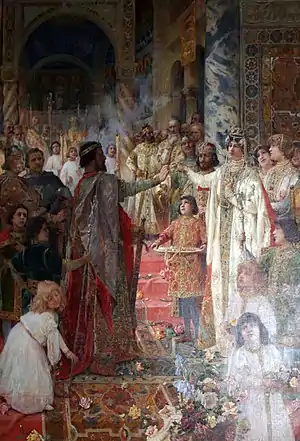1089
Year 1089 (MLXXXIX) was a common year starting on Monday (link will display the full calendar) of the Julian calendar.
| Millennium: | 2nd millennium |
|---|---|
| Centuries: | |
| Decades: | |
| Years: |
| 1089 by topic |
|---|
| Leaders |
|
| Birth and death categories |
| Births – Deaths |
| Establishments and disestablishments categories |
| Establishments – Disestablishments |
| Gregorian calendar | 1089 MLXXXIX |
| Ab urbe condita | 1842 |
| Armenian calendar | 538 ԹՎ ՇԼԸ |
| Assyrian calendar | 5839 |
| Balinese saka calendar | 1010–1011 |
| Bengali calendar | 496 |
| Berber calendar | 2039 |
| English Regnal year | 2 Will. 2 – 3 Will. 2 |
| Buddhist calendar | 1633 |
| Burmese calendar | 451 |
| Byzantine calendar | 6597–6598 |
| Chinese calendar | 戊辰年 (Earth Dragon) 3785 or 3725 — to — 己巳年 (Earth Snake) 3786 or 3726 |
| Coptic calendar | 805–806 |
| Discordian calendar | 2255 |
| Ethiopian calendar | 1081–1082 |
| Hebrew calendar | 4849–4850 |
| Hindu calendars | |
| - Vikram Samvat | 1145–1146 |
| - Shaka Samvat | 1010–1011 |
| - Kali Yuga | 4189–4190 |
| Holocene calendar | 11089 |
| Igbo calendar | 89–90 |
| Iranian calendar | 467–468 |
| Islamic calendar | 481–482 |
| Japanese calendar | Kanji 3 (寛治3年) |
| Javanese calendar | 993–994 |
| Julian calendar | 1089 MLXXXIX |
| Korean calendar | 3422 |
| Minguo calendar | 823 before ROC 民前823年 |
| Nanakshahi calendar | −379 |
| Seleucid era | 1400/1401 AG |
| Thai solar calendar | 1631–1632 |
| Tibetan calendar | 阳土龙年 (male Earth-Dragon) 1215 or 834 or 62 — to — 阴土蛇年 (female Earth-Snake) 1216 or 835 or 63 |

King Zvonimir and Queen Helena
Events
Europe
- King Demetrius Zvonimir of Croatia dies after a 12-year reign, and is succeeded by Stephen II. Zvonimir's widow, Queen Helena, plots the inheritance of the Croatian crown for her brother, King Ladislaus I of Hungary.
- June 24 – Viscount Gaston IV of Béarn (supported by French crusaders) reconquers the Aragonese city of Monzón, from Emir Al-Mustain II of the Taifa of Zaragoza.[1]
- August 18 – Emperor Henry IV marries Eupraxia (daughter of Grand Prince Vsevolod I) at Cologne. She is crowned and assumes the name Adelaide (or Adelheid).
- King George II abdicates the throne in favour of his 16-year-old son David IV (the Builder) who becomes ruler of Georgia (until 1125).
England
- Northumbria is divided by King William II into the counties of Northumberland, County Palatine of Durham, Yorkshire, Westmorland and Lancashire.
- August 11 – A powerful earthquake is recorded in England.
Religion
- March 21 – Cîteaux Abbey, the first Cistercian monastery, is established by a group of French monks under Robert of Molesme in southern France.
- September – The Synod of Melfi, led by Pope Urban II (his first papal council), issues decrees against simony and clerical marriage.[2]
- September – A church council, held in Constantinople, discuses relations between Eastern and Western Christianity.[3]
Births
- Abraham ibn Ezra, Jewish rabbi and philosopher (d. 1167)
- Berthold of Zwiefalten, German abbot and writer (d. 1169)
- Dahui Zonggao, Chinese Zen Buddhist monk (d. 1163)
- Han Shizhong, Chinese general (Song Dynasty) (d. 1151)
- Mahsati, Persian female poet and writer (approximate date)
- Richard de Luci, Norman High Sheriff of Essex (d. 1179)
- Sigurd I (the Crusader), king of Norway (d. 1130)
- Wulgrin II, count of Angoulême (approximate date)
Deaths
- May 24 – Lanfranc, archbishop of Canterbury
- May 29/30 – Mah-i Mulk Khatun wife of caliph al-Muqtadi (r. 1075–1094).
- May 31 – Sigwin of Are, archbishop of Cologne
- October 6 – Adalbero, bishop of Würzburg
- November 11 – Peter Igneus, Italian cardinal-bishop
- December 22 – William the Walloon, French abbot
- Agnes of Aquitaine, Italian countess of Savoy
- Demetrius Zvonimir, king of Croatia and Dalmatia
- Donnchad mac Domnaill Remair, king of Dublin
- Durandus of Troarn, French monk and theologian
- Isaac ibn Ghiyyat, Jewish rabbi and philosopher
- Mieszko Bolesławowic, Polish prince of Kraków
- Renauld II, French count of Nevers and Auxerre
- Theobold III (or Thibaut), French nobleman
References
- Canellas, Angel (1951). "Las Cruzadas de Aragon en el Siglo XI". Argensola: Revista de Ciencias Sociales del Instituto de Estudios Altoaragoneses. 7. ISSN 0518-4088. Archived from the original on July 14, 2014. Retrieved February 22, 2012.
- Pope Bl. Urban II, Catholic Encyclopedia, http://www.newadvent.org/cathen/15210a.htm
- Siecienski, Anthony Edward (2010). The Filioque: History of a Doctrinal Controversy. Oxford University Press. p. 117. ISBN 978-0-19-537204-5.
This article is issued from Wikipedia. The text is licensed under Creative Commons - Attribution - Sharealike. Additional terms may apply for the media files.